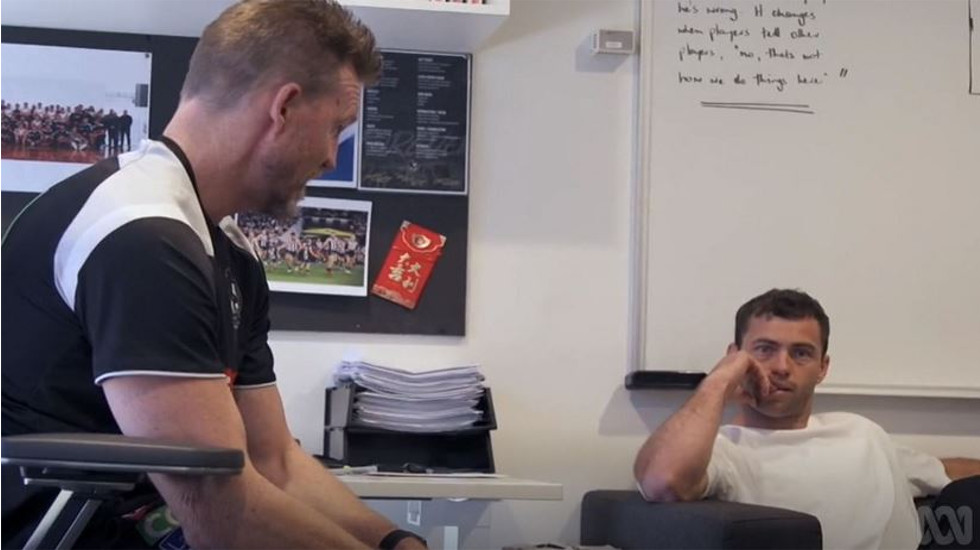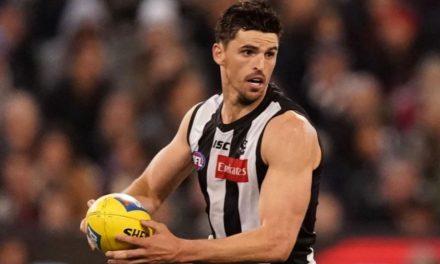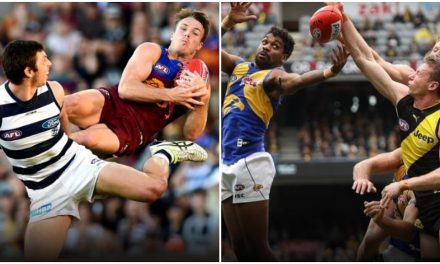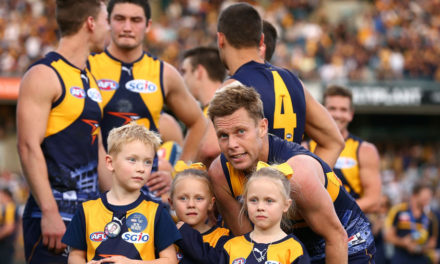The moment: Collingwood coach Nathan Buckley tells Jarryd Blair his career with the Pies is over. Picture: ABC TELEVISION
One of the most interesting football stories of recent times was the personal and professional path taken last year by Nathan Buckley.
Call it transformation, call it growth, but whatever tag you apply, it was a gripping plot. One in which the famously steely, hard-nosed football perfectionist and micro-manager, still not getting results and under intense pressure simply to retain his job, became the more empathic, understanding and compassionate face of his club.
At the end of 2017, Buckley was the favourite son whose Collingwood coaching career seemed destined to end unfulfilled and in disappointment, despite his obvious credentials. By grand final day 2018, such improvement had Buckley elicited in himself and his charges that they came, literally, within a couple of minutes of winning a premiership.
It was a journey we caught glimpses of here and there as Collingwood’s 2018 campaign played out. But it’s one anyone who watched a remarkable documentary aired on the ABC this week would understand even better now.
“Collingwood: From the Inside Out”, directed by Josh Cable and Marcus Cobbledick, is a brilliant piece of film-making, not only for the “fly on the wall” access it has to Collingwood’s entire season, but its focus on the personal stories of Buckley and three players – Brodie Grundy, Adam Treloar and Jarryd Blair.
In the documentary’s most gripping moment, we are taken inside the meeting between Blair and his coach in which the veteran 2010 premiership player is told Collingwood sees no future for him on its list.
Blair knows what’s coming, but that inkling doesn’t lessen the jolt of having the thumbs down officially delivered, nor his frustration about the futility of pleading his case.
This was genuine reality TV. And it struck a chord in the responses on social media after the program aired on Tuesday evening. Something of a whipping boy for Magpie fans in his later years with the club, Blair suddenly became even for his detractors a devoted, loyal servant watching his passion and professional dreams snuffed out in real time.
AFL football is elite, professional sport, and now a big business as well. But it doesn’t exist in a vacuum sealed off from the various trials and tribulations of everyday lives, thus Treloar’s courage in discussing his own battles with his mental health during the course of the season.
The final scene of the documentary features Buckley reflecting from a personal perspective, not only on the year, but of his own experiences of bitter grand final defeat, twice as a player, once as an assistant coach and now as the man in charge. There is still, however, a significant victory.
“Throughout life, everyone wants to have truths they come back to that drive them to their next level of growth or understanding,” he says.
“That can come in the form of numbers. It can come in the form of absolutes, vision, etcetera. But the human side of it is far more important than I ever imagined it was. And what’s even bigger than that is that I enjoy it far more than the numbers, when I thought that they were the be-all and end-all.”
Buckley, this documentary underlined, is a man who in a football sense now actually does see the forest for the trees. It’s a perspective many people involved in the game could use. Particularly those who help bring it to the masses.
There’s been some terrific football documentaries made in the last couple of decades, where prior to that about the only thing which came close were retrospectives on eras like “The Sensational ‘70s” or “The Electrifying ‘80s”.
“Year Of The Dogs” was a compelling look at what turned out to be a disastrous 1996 for Footscray, soon to undergo a metamorphosis of both profile and performance as the Western Bulldogs.
“The Draft” profiled three young talents about to enter the world of AFL football in Brendan Fevola, Adam Ramanauskas and Des Headland.
Pete Dickson was the man behind a wonderful series of films about famous grand finals “The Final Story”. And just recently, not one but two documentaries have exposed the brutal extent of the harsh and cruel treatment of a champion of the game in Adam Goodes during his final couple of seasons for Sydney.
But in a sport that receives a level of attention, interest and saturation coverage which, considering this country’s population, rivals any game in the world, those gems are still drops in the ocean.
Television networks have been notorious for their lack of interest in or care for Australian football’s history. Much archival footage from regular season games has over the years been lost, destroyed or thrown out.
Indeed, much of what exists by way of football history today on platforms like YouTube has been lovingly curated and uploaded not by anyone with vested interests , but regular football fans.
TV bosses seem perplexed when a show like “The Front Bar” finds at first a niche, then with just a little foresight a mass audience via an uncomplicated formula of nostalgia and light comedy.
What several failed attempts now to replicate that feel still seem not to have picked up on is the obvious depth of knowledge and passion for the game clear in the sort of referencing done by “The Front Bar’s” writers and producers.
The guests are celebrated, even when there is a joke or two at their expense. The humour still betrays an affection for the game and the subject shared by the audience, who are invited in on the gags, not made to feel like a schoolyard nerd attempting unsuccessfully to penetrate the in-jokes of the cool kids.
Not all football programming on television, nor football journalism per se, is guilty of that. But I do see enough examples now of an obsession with the immediate at the expense of the bigger picture, and a lack of preparedness to tackle shades of grey if there’s a dogmatic, controversial, albeit questionably-informed opinion to be had.
It’s why a couple of defeats on end can be portrayed publicly as a “crisis”, why a coach who made finals one season can nonetheless be described as “under pressure” the next, and why statistics can be wheeled out to support an apparent case in point free of any context, or for that matter, any attempt to explain their significance to an audience.
Can the modern football public not cope with nuance? Does it have an attention span too short to be able to see more than one side of an argument? It’s an issue hardly confined to coverage of football alone. But I think regardless of the subject, it does the audience a disservice.
To make programs like “Collingwood: From The Inside Out” takes time, energy and resources, three qualities of which not just the media, but the entire football industry don’t have a lot to spare.
To educate audiences in the value of the game’s history, its cultural impact and the passions that it arouses, isn’t necessarily a simple task. For those with the required patience, however, it would be a rewarding one.
For the younger, impressionable fans of today will be tomorrow’s custodians of the game. We owe it to them to help them see that our game is a lot more than just an alternative form of entertainment, or more even than just a sport.
That will make for more informed, sensitive and intelligent documentation of the football code we love. And we’ll all benefit from that.
Because if a man like Buckley, who has lived and breathed Australian football his entire life, absorbing seemingly all the knowledge it has to offer, can in his mid-40s discover a different, more holistic approach to the game, surely the rest of us can still find a different kind of wonder in it as well given the chance?
*This article first appeared at INKL.












Thanks for the tip on the podcast. Sat down and watched the Collingwood documentary made by Marcus and Josh. I taught Marcus a number a years ago and was always a fine young man. Great to see him succeed. He has made two documentaries on cycling well worth viewing. Seeing the old Olympic Park now as a football ground has never sat well with me as an athletic’s person and grew up as an ‘I hate Collingwood’ fan, so it’s hard to let go of those entrenched views. The video shone a positive light on the Collingwood club. Although the broken vase was a little Malthousesque and if I was a player would have wandered off into my own world with that presentation. Good luck Collingwood on your success. Video 9/10